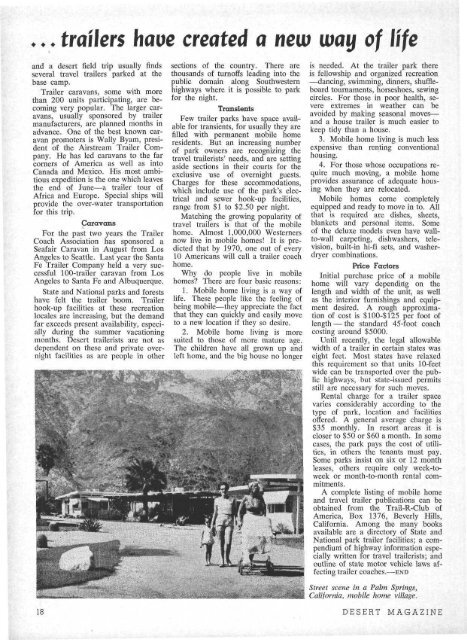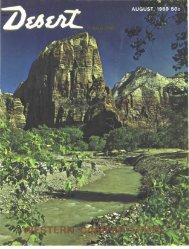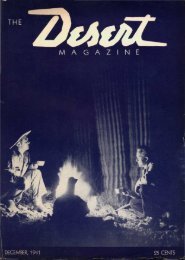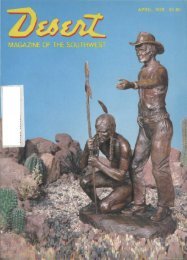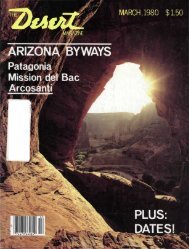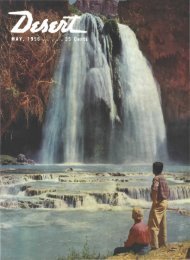Desert Book - Desert Magazine of the Southwest
Desert Book - Desert Magazine of the Southwest
Desert Book - Desert Magazine of the Southwest
Create successful ePaper yourself
Turn your PDF publications into a flip-book with our unique Google optimized e-Paper software.
... trailers have created a new way <strong>of</strong> life<br />
and a desert field trip usually finds<br />
several travel trailers parked at <strong>the</strong><br />
base camp.<br />
Trailer caravans, some with more<br />
than 200 units participating, are becoming<br />
very popular. The larger caravans,<br />
usually sponsored by trailer<br />
manufacturers, are planned months in<br />
advance. One <strong>of</strong> <strong>the</strong> best known caravan<br />
promoters is Wally Byam, president<br />
<strong>of</strong> <strong>the</strong> Airstream Trailer Company.<br />
He has led caravans to <strong>the</strong> far<br />
corners <strong>of</strong> America as well as into<br />
Canada and Mexico. His most ambitious<br />
expedition is <strong>the</strong> one which leaves<br />
<strong>the</strong> end <strong>of</strong> June—a trailer tour <strong>of</strong><br />
Africa and Europe. Special ships will<br />
provide <strong>the</strong> over-water transportation<br />
for this trip.<br />
Caravans<br />
For <strong>the</strong> past two years <strong>the</strong> Trailer<br />
Coach Association has sponsored a<br />
Seafair Caravan in August from Los<br />
Angeles to Seattle. Last year <strong>the</strong> Santa<br />
Fe Trailer Company held a very successful<br />
100-trailer caravan from Los<br />
Angeles to Santa Fe and Albuquerque.<br />
State and National parks and forests<br />
have felt <strong>the</strong> trailer boom. Trailer<br />
hook-up facilities at <strong>the</strong>se recreation<br />
locales are increasing, but <strong>the</strong> demand<br />
far exceeds present availability, especially<br />
during <strong>the</strong> summer vacationing<br />
months. <strong>Desert</strong> trailerists are not as<br />
dependent on <strong>the</strong>se and private overnight<br />
facilities as are people in o<strong>the</strong>r<br />
sections <strong>of</strong> <strong>the</strong> country. There are<br />
thousands <strong>of</strong> turn<strong>of</strong>fs leading into <strong>the</strong><br />
public domain along <strong>Southwest</strong>ern<br />
highways where it is possible to park<br />
for <strong>the</strong> night.<br />
Transients<br />
Few trailer parks have space available<br />
for transients, for usually <strong>the</strong>y are<br />
filled with permanent mobile home<br />
residents. But an increasing number<br />
<strong>of</strong> park owners are recognizing <strong>the</strong><br />
travel trailerists' needs, and are setting<br />
aside sections in <strong>the</strong>ir courts for <strong>the</strong><br />
exclusive use <strong>of</strong> overnight guests.<br />
Charges for <strong>the</strong>se accommodations,<br />
which include use <strong>of</strong> <strong>the</strong> park's electrical<br />
and sewer hook-up facilities,<br />
range from $1 to $2.50 per night.<br />
Matching <strong>the</strong> growing popularity <strong>of</strong><br />
travel trailers is that <strong>of</strong> <strong>the</strong> mobile<br />
home. Almost 1,000,000 Westerners<br />
now live in mobile homes! It is predicted<br />
that by 1970, one out <strong>of</strong> every<br />
10 Americans will call a trailer coach<br />
home.<br />
Why do people live in mobile<br />
homes? There are four basic reasons:<br />
1. Mobile home living is a way <strong>of</strong><br />
life. These people like <strong>the</strong> feeling <strong>of</strong><br />
being mobile—<strong>the</strong>y appreciate <strong>the</strong> fact<br />
that <strong>the</strong>y can quickly and easily move<br />
to a new location if <strong>the</strong>y so desire.<br />
2. Mobile home living is more<br />
suited to those <strong>of</strong> more mature age.<br />
The children have all grown up and<br />
left home, and <strong>the</strong> big house no longer<br />
is needed. At <strong>the</strong> trailer park <strong>the</strong>re<br />
is fellowship and organized recreation<br />
—dancing, swimming, dinners, shuffleboard<br />
tournaments, horseshoes, sewing<br />
circles. For those in poor health, severe<br />
extremes in wea<strong>the</strong>r can be<br />
avoided by making seasonal moves—<br />
and a house trailer is much easier to<br />
keep tidy than a house.<br />
3. Mobile home living is much less<br />
expensive than renting conventional<br />
housing.<br />
4. For those whose occupations require<br />
much moving, a mobile home<br />
provides assurance <strong>of</strong> adequate housing<br />
when <strong>the</strong>y are relocated.<br />
Mobile homes come completely<br />
equipped and ready to move in to. All<br />
that is required are dishes, sheets,<br />
blankets and personal items. Some<br />
<strong>of</strong> <strong>the</strong> deluxe models even have wallto-wall<br />
carpeting, dishwashers, television,<br />
built-in hi-fi sets, and washerdryer<br />
combinations.<br />
Price Factors<br />
Initial purchase price <strong>of</strong> a mobile<br />
home will vary depending on <strong>the</strong><br />
length and width <strong>of</strong> <strong>the</strong> unit, as well<br />
as <strong>the</strong> interior furnishings and equipment<br />
desired. A rough approximation<br />
<strong>of</strong> cost is $100-$ 125 per foot <strong>of</strong><br />
length — <strong>the</strong> standard 45-foot coach<br />
costing around $5000.<br />
Until recently, <strong>the</strong> legal allowable<br />
width <strong>of</strong> a trailer in certain states was<br />
eight feet. Most states have relaxed<br />
this requirement so that units 10-feet<br />
wide can be transported over <strong>the</strong> public<br />
highways, but state-issued permits<br />
still are necessary for such moves.<br />
Rental charge for a trailer space<br />
varies considerably according to <strong>the</strong><br />
type <strong>of</strong> park, location and facilities<br />
<strong>of</strong>fered. A general average charge is<br />
$35 monthly. In resort areas it is<br />
closer to $50 or $60 a month. In some<br />
cases, <strong>the</strong> park pays <strong>the</strong> cost <strong>of</strong> utilities,<br />
in o<strong>the</strong>rs <strong>the</strong> tenants must pay.<br />
Some parks insist on six or 12 month<br />
leases, o<strong>the</strong>rs require only week-toweek<br />
or month-to-month rental commitments.<br />
A complete listing <strong>of</strong> mobile home<br />
and travel trailer publications can be<br />
obtained from <strong>the</strong> Trail-R-Club <strong>of</strong><br />
America, Box 1376, Beverly Hills,<br />
California. Among <strong>the</strong> many books<br />
available are a directory <strong>of</strong> State and<br />
National park trailer facilities; a compendium<br />
<strong>of</strong> highway information especially<br />
written for travel trailerists; and<br />
outline <strong>of</strong> state motor vehicle laws affecting<br />
trailer coaches.—END<br />
Street scene in a Palm Springs,<br />
California, mobile home village.<br />
18 DESERT MAGAZINE


